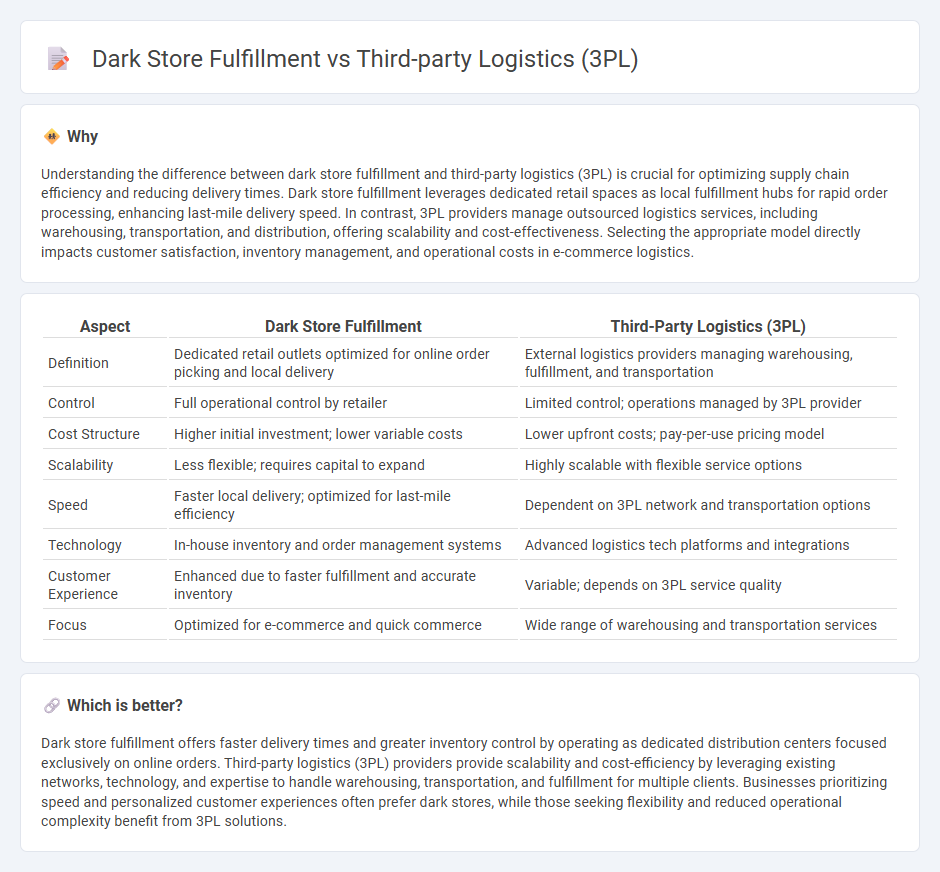
Dark store fulfillment streamlines last-mile delivery by converting retail locations into localized distribution centers, enhancing order accuracy and speed. Third-party logistics (3PL) providers offer comprehensive supply chain solutions, including warehousing, transportation, and inventory management, enabling businesses to scale efficiently without investing in infrastructure. Explore the key differences and benefits to determine the optimal logistics strategy for your business needs.
Why it is important
Understanding the difference between dark store fulfillment and third-party logistics (3PL) is crucial for optimizing supply chain efficiency and reducing delivery times. Dark store fulfillment leverages dedicated retail spaces as local fulfillment hubs for rapid order processing, enhancing last-mile delivery speed. In contrast, 3PL providers manage outsourced logistics services, including warehousing, transportation, and distribution, offering scalability and cost-effectiveness. Selecting the appropriate model directly impacts customer satisfaction, inventory management, and operational costs in e-commerce logistics.
Comparison Table
| Aspect | Dark Store Fulfillment | Third-Party Logistics (3PL) |
|---|---|---|
| Definition | Dedicated retail outlets optimized for online order picking and local delivery | External logistics providers managing warehousing, fulfillment, and transportation |
| Control | Full operational control by retailer | Limited control; operations managed by 3PL provider |
| Cost Structure | Higher initial investment; lower variable costs | Lower upfront costs; pay-per-use pricing model |
| Scalability | Less flexible; requires capital to expand | Highly scalable with flexible service options |
| Speed | Faster local delivery; optimized for last-mile efficiency | Dependent on 3PL network and transportation options |
| Technology | In-house inventory and order management systems | Advanced logistics tech platforms and integrations |
| Customer Experience | Enhanced due to faster fulfillment and accurate inventory | Variable; depends on 3PL service quality |
| Focus | Optimized for e-commerce and quick commerce | Wide range of warehousing and transportation services |
Which is better?
Dark store fulfillment offers faster delivery times and greater inventory control by operating as dedicated distribution centers focused exclusively on online orders. Third-party logistics (3PL) providers provide scalability and cost-efficiency by leveraging existing networks, technology, and expertise to handle warehousing, transportation, and fulfillment for multiple clients. Businesses prioritizing speed and personalized customer experiences often prefer dark stores, while those seeking flexibility and reduced operational complexity benefit from 3PL solutions.
Connection
Dark store fulfillment and third-party logistics (3PL) are interconnected as 3PL providers manage the inventory, order processing, and last-mile delivery for dark stores, enabling efficient e-commerce fulfillment. Leveraging 3PL expertise allows dark stores to optimize storage space, streamline pick-and-pack operations, and scale rapidly without heavy capital investment. Data-driven logistics and real-time tracking within 3PL networks enhance accuracy and speed in fulfilling online orders from dark stores.
Key Terms
Outsourcing
Third-party logistics (3PL) providers specialize in outsourcing comprehensive supply chain management, warehousing, and transportation services to optimize distribution efficiency. Dark store fulfillment involves dedicated retail spaces optimized solely for online order processing, enhancing last-mile delivery speed without traditional storefront interactions. Explore the benefits and operational differences of outsourcing these models to streamline your e-commerce fulfillment strategy.
Micro-fulfillment
Micro-fulfillment centers optimize last-mile delivery by leveraging automated, small-scale warehouses located near urban areas, contrasting with traditional third-party logistics (3PL) that rely on larger, centralized distribution hubs. While 3PL providers manage warehousing, inventory, and transportation outsourced by retailers, dark store fulfillment exclusively serves e-commerce orders through dedicated fulfillment hubs without serving walk-in customers. Explore how micro-fulfillment transforms supply chain efficiency and customer experience in modern retail.
Last-mile delivery
Third-party logistics (3PL) providers specialize in managing complex supply chains, offering scalable last-mile delivery solutions through extensive carrier networks and advanced tracking technologies. Dark store fulfillment centers optimize last-mile delivery by functioning as localized warehouses dedicated to rapid order processing, enabling faster and more efficient customer deliveries in urban areas. Explore the benefits of both models to understand which last-mile delivery strategy best fits your business needs.
Source and External Links
What is 3PL (third-party logistics)? - A 3PL provider offers outsourced logistics services such as transportation management or warehousing, handling one or more aspects of procurement and fulfillment to help businesses manage supply chain and distribution efficiently.
What is a 3PL? Third-Party Logistics Process Explained - A 3PL is a business that provides logistics services including inventory management, warehousing, order fulfillment, returns processing, and transportation to help companies optimize supply chain operations and focus on core business activities.
How 3PLs Revolutionize Logistics and Supply Chain ... - Radial - 3PL involves outsourcing logistics and supply chain functions like transportation, warehousing, and customs brokerage to specialized companies that improve efficiency, flexibility, and growth for businesses by leveraging their expertise and technology.
 dowidth.com
dowidth.com